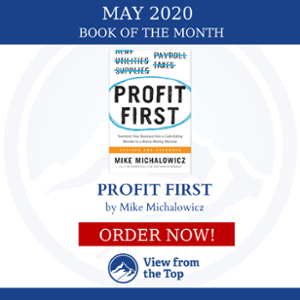-1.png?width=512&name=-%20aaron%20walker%20%26%20the%20vftt%20team%20-%20(1)-1.png)
If you’re like me, there’s something about a roaring, powerful, high-performance engine. I love to take my grandson to car shows in Nashville each year, and we gawk at those fancy European sports cars with V-12 engines. Do you have a favorite sports car or truck? Let me know in the comments section.
If you don’t know car terminology well, “V-12” means the engine has twelve cylinders, and the more cylinders an engine has, the more horsepower it has. I love how it’s the same for our online mastermind groups at Iron Sharpens Iron. When you surround yourself with high-caliber entrepreneurs, you can’t help but perform better.
Anyway, we’re going to do a deep dive in our mastermind groups this month on The 12-Week Year, a book by my friend Brian Moran. This book changed my life and business, by helping me use the number 12 in a different category. I’m going to tell you a little bit about the theory and practical guidance Brian gives in the book, and how it will transform your business into a smooth, consistent flywheel of execution year-round.
Why 12 Weeks?
When I first heard of The 12-Week Year, I was a little confused. How can you fit 365 days of work, family, business, hobbies and everything else into 12 weeks?
Of course, Brian’s not suggesting that. He’s steering entrepreneurs toward an outcome that the most successful leaders in the world understand very well. To grow and scale anything, you have to become “exclusive” to everything that could distract you, or send you off-course. You have to be relentless about two or three top priorities. And you have to do them in a timeframe that sets you up to capitalize on demand for what you offer.
As Warren Buffett said, “The difference between successful people and reallysuccessful people is that really successful people say ‘No’ to almost everything.”
That’s wise advice from a very successful man, but a good coach or mentor should also factor time into the equation. If you say “No,” for example, to a certain type of client, you have a good start. That helps to identify who you’re going to target for business. But it doesn’t tell you anything about when you’re going to start targeting them, or what you’ll do within that time period.
Let me tell you, we’ve found Brian’s book extremely helpful with those details. If you can identify your top priorities, and then set a 12-week schedule with daily steps to work your way toward goals, you can put a lot of meat on the bones! Plus, it helps you block out all other distractions and temptations that derail your progress.
As a bonus, if you belong to any mastermind groups online or you use business coaching services, you can use this as an ongoing accountability tool. You can enable your trusted advisors to help you stay focused on the most important things.
Okay, But Why Not Four Weeks, or 52 Weeks?
You’ve probably noticed - time can be “too short” or “too long.” Companies and individuals have experimented with longer and shorter timeframes for ages.
The problem with a shorter time frame, like four weeks, is too many external things can happen. You only need a few setbacks from circumstances beyond your control to throw you off-course, so you can’t recover your pace. Then you end up failing to meet goals, and procrastination wins by default. You get discouraged and say, “What’s the point of trying to follow a schedule?”
The other extreme of this is a time frame that’s too long. An entire calendar year can be handy for picking three or four “top priorities” for your business to grow. But when you get to the tactical level, you and your team need a lot of daily specifics. Otherwise it’s just too easy in February to think, “We’ve got ten months left to do this.” Next thing you know, December’s here and everyone’s checking out for the holidays.
But twelve weeks is 55-60 working days, if you discount weekends and holidays. That number is magic with human beings. Giving someone 60 days to finish a project that can be broken evenly into daily, weekly or monthly tasks helps them separate and prioritize different pieces of a puzzle. It tells them, over and over, what they need to focus on. It helps define what they can afford to ignore. Best of all, when someone gets to the end of it, they get to say, “I accomplished what I set out to do.”
That someone should be you.
The Execution Gap
Brian makes a point specific to time management in his book. He says:
“It’s not what you know; it’s not even who you know; it’s what you implement that counts.”
When it comes to doing your assigned work, I couldn’t agree more. I love delegating and having an excellent team to support me at View From the Top. There are tasks I’ve long since delegated, because it makes no sense for me to do them. Others, like facilitating masterminds online, can be split between me and other members. But some tasks, such as appearing in podcast interviews, only I can do. Those need to get done, or we won’t grow as a company.
Most entrepreneurs have a severe “execution gap,” when it comes to direct responsibilities. They’re weighed down by roles and tasks they shouldn’t be doing. What’s worse, they’re carrying these things indefinitely, because they fail to use time and decision-making to their advantage.
Once you make your move to a program like The 12-Week Year, however, you’ll start to outperform your competitors and enable your team to smash their goals as well. My assistant, Cherry, is an ace when it comes to booking me on podcast interviews. I wake up to two or three on my calendar nearly every month, without lifting a finger. That’s one reason I’m able to show up on podcasts at such a clip.
We know consistency is a huge asset to a business owner. The entrepreneur who is disciplined enough to execute their responsibility day in, day out over a long period of time has an advantage. But if this is a struggle for you, I want you to do two things:
- Look up The 12-Week Year by Brian Moran and order yourself a copy;
- Apply to join one of our mastermind groups today at this link.





